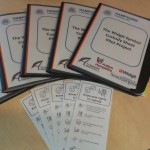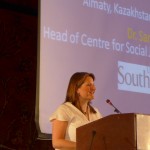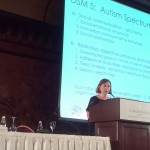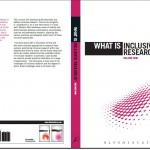This summer the Social Justice and Inclusive Education (SJIE) research centre has supported a research internship through the University’s Excel Placement Scheme. The scheme represents an excellent opportunity for students at the University to gain specific work experience in the Easter and summer vacation periods. This was the first Excel internship to be offered in Southampton Education School, aligning with the University’s strategic priority to provide a ‘distinctive Southampton educational experience’ for students.
Sarah Parsons, head of the SJIE research centre said:
‘It was really important for us in the research centre to promote students’ research opportunities and aspirations. We wanted to support students to gain research skills and spark their research interests which they may then take into employment or pursue through postgraduate research.’
The internship was highly competitive, attracting more than 20 applications, with shortlisted applicants also undertaking an assessment day focusing on group-work, as well as office-based, skills. Lucy Westron, who has just graduated from Southampton Education School with a first class BSc honours degree in Education, was the successful applicant and started the 8-week internship at the beginning of June.
 Lucy says about her experiences on the internship:
Lucy says about her experiences on the internship:
“I was studying on the BSc Education degree as I knew that I wanted to enter the teaching profession, and have secured a place on the primary PGCE here at Southampton for September. Throughout the course of my degree, there have been many opportunities to engage with educational research, and gain valuable insight into working in the wider field of education. This enlightened and inspired a natural curiosity, which completely transformed the way I view the education systems and structures that I hope to be working within. The internship opportunity has provided me with the perfect opportunity to truly experience working within educational research, and I feel extremely fortunate that this particular position was focused within the areas of particular personal interest to me. The opportunity has instilled a deeper understanding as to the importance of having informed practices within our classrooms, and more importantly for me personally, has affirmed that it is definitely something I want to engage with later on in my career, and enthused me to aspire to complete a PhD and enter the world of educational research.”
Lucy has been working on research projects with Kiki Messiou and Sarah Parsons. Kiki’s research focuses on developing inclusive practices by engaging with students’ voices. Lucy has been involved in Kiki’s European Union project “Responding to diversity by engaging with students’ voices: a strategy for teacher development” (2011-2014). In particular, Lucy has qualitatively analysed interview transcripts, and quantitatively analysed students’ and teachers’ questionnaires; she has also written a brief literature review around the theme of effective teacher development.
Sarah’s work focuses on the application of collaborative technologies for supporting social interaction skills for children on the autism spectrum. Lucy has been undertaking some qualitative analysis of unprompted social conversation transcripts between pairs of children with autism, and pairs of children with typical development. Lucy has also been supporting Sarah’s current project which is a collaboration with Autism Hampshire, Hampshire Constabulary, Widgit, and The Appropriate Adult Service. The project is an evaluation of the pilot implementation of Widgit Symbol Custody Sheets, which have been designed to make custody information more accessible for young people and vulnerable adults.
 Lucy has been supporting the important administrative aspects of the project, including collating the packs ready for use. She has also been working on an annotated bibliography of relevant research papers and reports that will be included in the final project report.
Lucy has been supporting the important administrative aspects of the project, including collating the packs ready for use. She has also been working on an annotated bibliography of relevant research papers and reports that will be included in the final project report.
The internship has proved a great success for Lucy personally and also for colleagues in the centre; we will hope to be able to offer similar opportunities next year.







